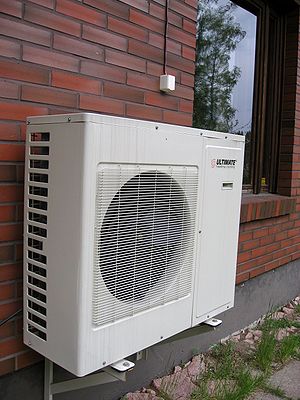
A heat pump system is a system that conveys heat from one area (heat source) to another (heat sink) by using mechanical work or a high-temperature heat source. The system uses either a compression heat pump or an absorption heat pump. Most conventional heat pump systems give off the heat directly to the indoor air, or to tap water (see solar thermal collector), or to water circulated for heating (radiators).
It is a device used to heat and sometimes also cool buildings by transferring thermal energy from a cooler space to a warmer space using the refrigeration cycle, being the opposite direction in which heat transfer would take place without the application of external power. Common device types include air source heat pumps, ground source heat pumps, ater source heat pumps and exhaust air heat pumps. Heat pumps are also often used in district heating systems.
The efficiency of a heat pump is expressed as a coefficient of performance (COP), or seasonal coefficient of performance (SCOP). The higher the number, the more efficient a heat pump is and the less energy it consumes. When used for space heating these devices are typically much more energy efficient than simple electrical resistance heaters. Heat pumps have a smaller carbon footprint than heating systems burning fossil fuels such as natural gas,[1] but those powered by hydrogen are also low-carbon and may become competitors.[2]
- ↑ "The UK is sabotaging its own plan to decarbonize heating". Retrieved 2021-06-06.
- ↑ "Can the UK rely on hydrogen to save its gas boilers?". 2021-05-21. Retrieved 2021-06-06.
Pages in category "Heat pump"
The following 7 pages are in this category, out of 7 total.